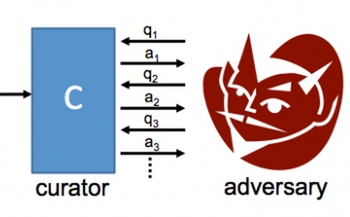All Images
News Release 15-125
Theoretical computer science provides answers to data privacy problem
New tools allow researchers to share and study sensitive data safely by applying 'differential privacy'
This material is available primarily for archival purposes. Telephone numbers or other contact information may be out of date; please see current contact information at media contacts.

Privacy Tools for Sharing Research Data: A National Science Foundation Secure and Trustworthy Cyberspace Project. A multidisciplinary effort to help enable the collection, analysis, and sharing of personal data for research in social science and other fields while providing privacy for individual subjects. In particular, the researchers aim to build an array of computational, statistical, legal, and policy tools that can be incorporated into data repositories to make privacy-protective data-sharing easier for lay researchers. These tools will integrate with the Dataverse Network software, which is already used to host data repositories around the world.
Credit: Theoretical computer science research community and the Computing Community Consortium
Download the high-resolution JPG version of the image. (120.2 KB)
Use your mouse to right-click (Mac users may need to Ctrl-click) the link above and choose the option that will save the file or target to your computer.

Through a differentially private interface for data analysis, it is impossible for an adversary to extract information that is specific to one individual, no matter how much other information or computing power it has at its disposal.
Credit: Salil Vadhan, Harvard University
Download the high-resolution 30 version of the image. (187.9 KB)
Use your mouse to right-click (Mac users may need to Ctrl-click) the link above and choose the option that will save the file or target to your computer.

Salil Vadhan is a professor of Computer Science and Applied Mathematics at Harvard University.
Credit: Salil Vadhan, Harvard University
Download the high-resolution JPG version of the image. (3.6 MB)
Use your mouse to right-click (Mac users may need to Ctrl-click) the link above and choose the option that will save the file or target to your computer.


